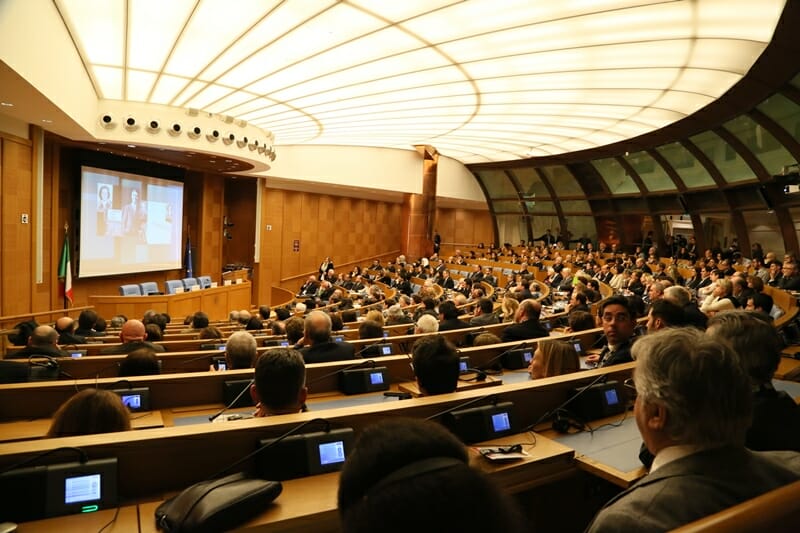
Mar 13, 2015 | Focolare Worldwide
 Is there a “politics that is really worth the trouble” at a time in history moment when politics is totally in crisis, often associated with corruption and special interests? This was discussed during the first of numerous worldwide events marking the 7th anniversary of Chiara Lubich (1920-2008). “Her strong and simple faith,” President of the Italian Republic, Sergio Mattarella, stated: “united to a remarkable ability to read the modern world and accept its challenges, has inspired the life of thousands of people around the world, constantly exhorting national and international institutions to promote values of brotherhood and mutual respect in families, community, and among peoples.”
Is there a “politics that is really worth the trouble” at a time in history moment when politics is totally in crisis, often associated with corruption and special interests? This was discussed during the first of numerous worldwide events marking the 7th anniversary of Chiara Lubich (1920-2008). “Her strong and simple faith,” President of the Italian Republic, Sergio Mattarella, stated: “united to a remarkable ability to read the modern world and accept its challenges, has inspired the life of thousands of people around the world, constantly exhorting national and international institutions to promote values of brotherhood and mutual respect in families, community, and among peoples.”
For the Focolare foundress, entering into politics signified responding to the call: “to the love of loves,” as she put it. A calling to which the response “is above all an act of brotherhood: one acts in favour of something public that regards others, desiring their good as if it were one’s own.” For this reason, said Focolare president Maria Voce, in her opening address to the “Chiara Lubich: Unity and Politics” gathering, “it is absolutely necessary to begin from unity, which is the only thing able to give the correct relevance to freedom and equality.”
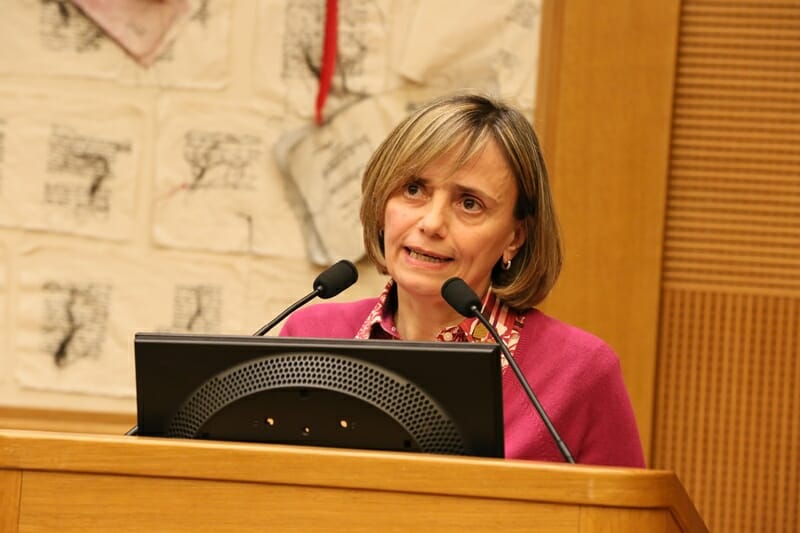 What does it mean to live universal brotherhood in such an environment? Iole Mucciconi, who plays a leadership role at the Presidency of the Council of Ministers, shared his testimony : “It is important to begin each day by committing oneself to do one’s job to the best of one’s ability. I always remember Chiara Lubich’s recommendations for living brotherhood: aim to live an honest life, with moral purity, detachment from money, sharing the joys and sorrows of your sisters and brothers.”
What does it mean to live universal brotherhood in such an environment? Iole Mucciconi, who plays a leadership role at the Presidency of the Council of Ministers, shared his testimony : “It is important to begin each day by committing oneself to do one’s job to the best of one’s ability. I always remember Chiara Lubich’s recommendations for living brotherhood: aim to live an honest life, with moral purity, detachment from money, sharing the joys and sorrows of your sisters and brothers.”
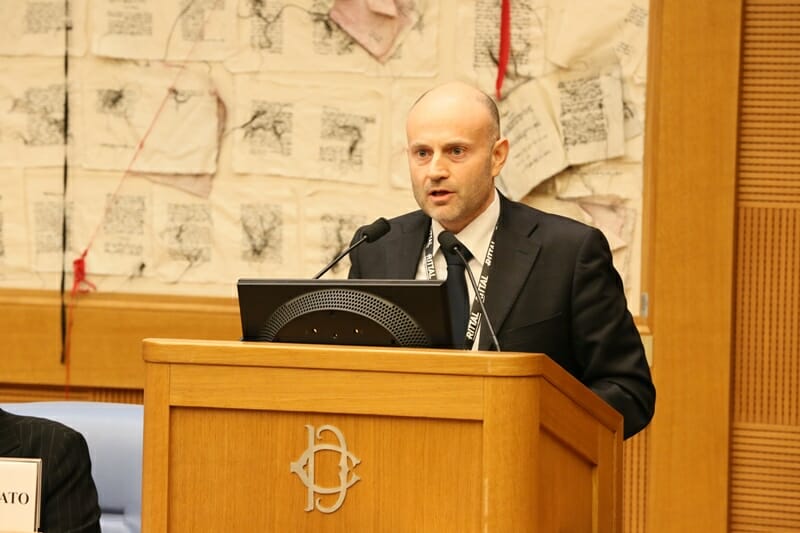 The problem of corruption, which unfortunately pervades the Italian State, was also much felt by Raffaele Scamardi, Commissioner of Public Works in the XII District of Rome at a time when magistrates and law enforcement are trying to dismantle a network of brothels that has entangled the Roman capital. “And yet, a politics in favour of others is still possible: repairing roads, listening to citizens and their need for justice, as well as working with the transparency so as to keep corruption at bay.” A similar point was made by Dieudonné Upira Sunguma, one time Civil Service Minister for the Democratic Republic of Congo, who often had to refuse gifts that were meant to corrupt him.
The problem of corruption, which unfortunately pervades the Italian State, was also much felt by Raffaele Scamardi, Commissioner of Public Works in the XII District of Rome at a time when magistrates and law enforcement are trying to dismantle a network of brothels that has entangled the Roman capital. “And yet, a politics in favour of others is still possible: repairing roads, listening to citizens and their need for justice, as well as working with the transparency so as to keep corruption at bay.” A similar point was made by Dieudonné Upira Sunguma, one time Civil Service Minister for the Democratic Republic of Congo, who often had to refuse gifts that were meant to corrupt him.
Young people of the Focolare the Italian Parliament. The tragedy of Syrian refugees in Jordan and Lebanon interrupted the morning in the parliamentary hall. The words of Lara and George were simple and sharp and hopeful as any twenty year-old’s would be. The war that is tearing Syria apart is a real drama that is being enacted before our very eyes. Abraham, on the other hand, comes from a land torn by drug trafficking: Mexico. One of the features of the 7th anniversary of Chiara Lubich’s death has been the political projects and engagement on the frontiers by young members of the Focolare. Three hundred of these young people are in Rome to attend the events, and to display their projects spread across the planet in favour of dialogue, solidarity, and peace.
When questioned about the role of politics in healing conflicts and protecting human rights, the president of the Chamber of Deputies, Laura Boldrini, was thankful for the young people’s courage in “shortening the distance between institutions and citizenry” and she asked that we “not give in to those who would change the DNA of our people, which is made of hospitality and solidarity.” She encouraged the young people to place themselves at the disposal of public affairs with generosity, in order to influence choices and decisions,” performing a service for the country and never falling flat because of an opposing sides and adversarial approach to politics, because “there is a vision of society contained in the values of Chiara Lubich, and this is politics, this is never removing yourself.”
A discussion followed about the wounds of our own times: the relationship with the Muslim world; wars and epidemics in Africa; natural disasters in Southeast Asia. Political scientist, Pasquale Ferrara, insisted that “dialogue is the weapon of the weak;” and economist Luigino Bruni spoke about huge social disparities, recalling that “the most important happiness isn’t our own, but that of others. And so it is worthwhile to become involved in finding creative solutions to problems, and joining with one another to do new things”
According to Paolo Frizzi, the communitarian sense of the projects that had been presented by the young people of the Focolare, which were monitored by the Universal Brotherhood Observatory and promoted by the United World Project, demonstrates “the anthropological and civil prospective of the charism of unity, which is capable of forging a new humanity capable of sharing projects that even begin from our very differences, in order to build things that will endure and help the world.”
“Fraternity on the way” the title chosen for the event, calls for concrete steps by politicians and citizens together.
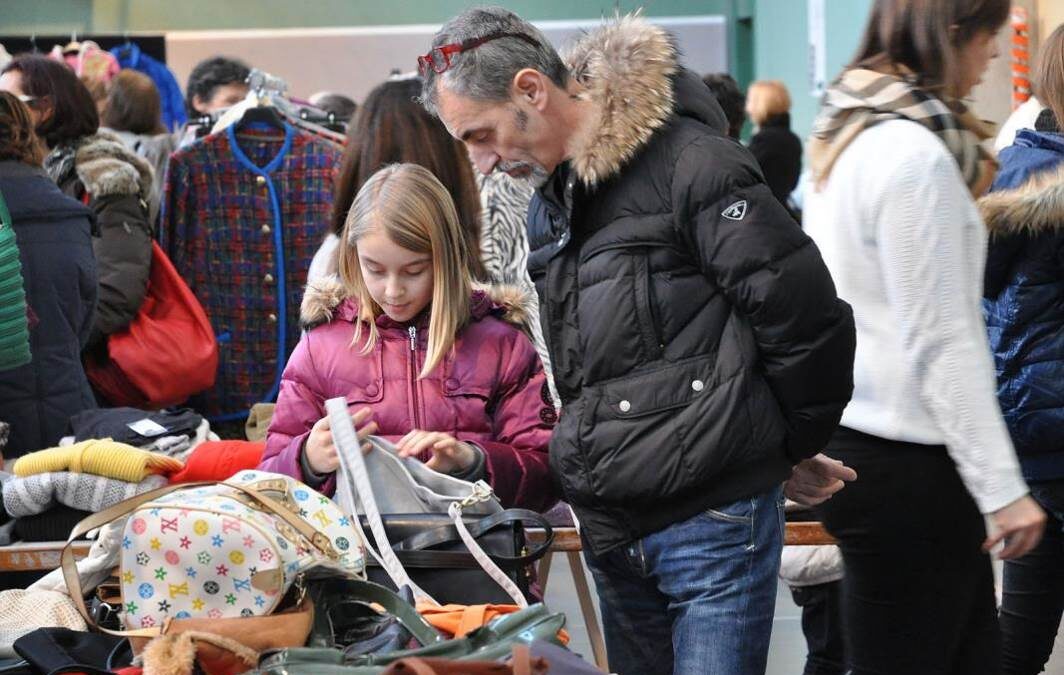
Mar 13, 2015 | Focolare Worldwide, Senza categoria
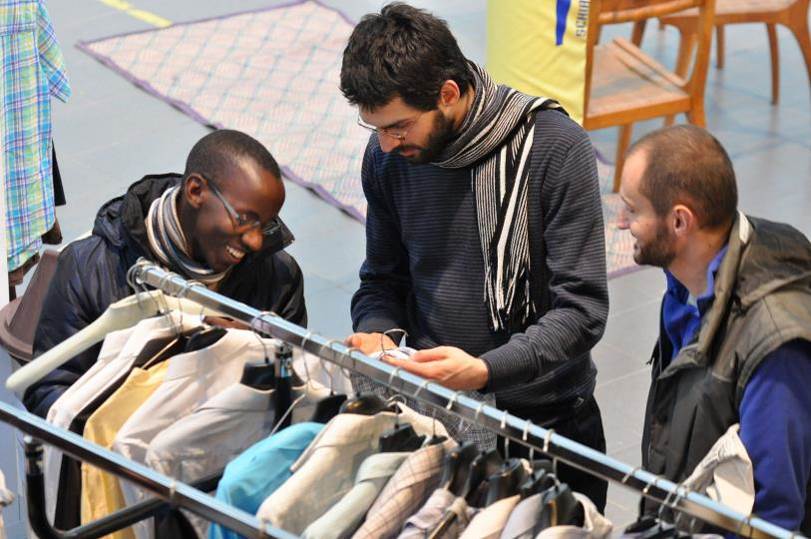 This permanent sharing of goods helps many who are in need during the current economic crisis.” These are the first words of a document describing the Bundle Project which began in May in Loppiano. The carrying of a bundle, or swag, is associated with a vagabond. It was used to hold a few poor possessions and therefore associated with the poor. For Chiara Lubich it signified sharing, giving and redistributing material possessions among the members of the nascent Focolare community of the mid-1040s. This is how a practice was begun of freely depriving oneself of what was excess, or even necessary, in order to share a gift with those in need. That is the origin of the bundle, which has now found a home at the Lionello Bonfanti Business Park in Loppiano, a meeting place between those who have something to share and those who are in need. “Three thousand people have already shown up,” say coordinating team members Roberta Menichetti and Araceli Bigoni,“mostly families who live in the region.” Up until today thousands of clothing items, home furnishings, books, tools, utensils and games as well as intangible items such as time, talents, and availability – have come and gone off with new owners.”
This permanent sharing of goods helps many who are in need during the current economic crisis.” These are the first words of a document describing the Bundle Project which began in May in Loppiano. The carrying of a bundle, or swag, is associated with a vagabond. It was used to hold a few poor possessions and therefore associated with the poor. For Chiara Lubich it signified sharing, giving and redistributing material possessions among the members of the nascent Focolare community of the mid-1040s. This is how a practice was begun of freely depriving oneself of what was excess, or even necessary, in order to share a gift with those in need. That is the origin of the bundle, which has now found a home at the Lionello Bonfanti Business Park in Loppiano, a meeting place between those who have something to share and those who are in need. “Three thousand people have already shown up,” say coordinating team members Roberta Menichetti and Araceli Bigoni,“mostly families who live in the region.” Up until today thousands of clothing items, home furnishings, books, tools, utensils and games as well as intangible items such as time, talents, and availability – have come and gone off with new owners.” 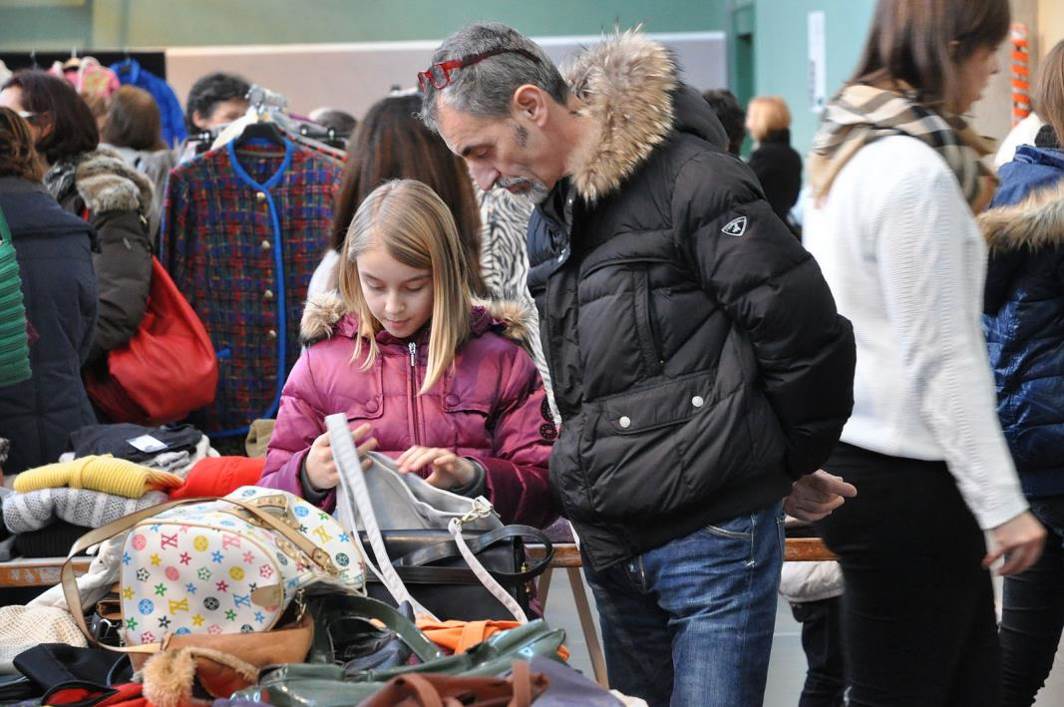 “It’s not by coincidence that the project is hosted in the Lionello Bonfanti Business Park,” reiterates Eva Gullo, President of the EoC Association which administrates the Business Park. “This space is ‘home’ to all the components of the Economy of Communion. It is also dedicated to spreading the ‘culture of giving’, that is, the ability to contribute to the the social welfare beginning from one’s self.” There are many stories of generosity surrounding this project. Like the family that was living in some buildings on the parish grounds of a nearby town. When they were able to move into a small house, they found all the furnishings for their new home here at this opportunity shop. Our network of friends also arranged for the transport and set up of the small house at zero cost. Words like “providence” and “trust” are quite common around here. Like that afternoon when an infant’s crib was found and, just as it was taken away, another request was made for the same type of crib. Not even a half hour later the new crib arrived! The Bundle Project won the “Engaging in Society” award offered by the New Poverty Section of the Catholic Insurance Foundation. Those funds will be used for a more functional layout of the premises. Evening events were begun as a result of the sharing and giving. Formation courses and evening discussions with experts in the field, on topics such as consumerism, relational goods and trust, as well as training courses in economic approaches that are centred on the dignity of the human person. There is a “contributions” box at the entrance for anyone who wishes to leave a few euros for what they have found. The monies collected in the box have been used to pay the insurance bills of some local people and even the basic needs of others. Source: Loppiano online Source: Loppiano permanent sharing of goods project
“It’s not by coincidence that the project is hosted in the Lionello Bonfanti Business Park,” reiterates Eva Gullo, President of the EoC Association which administrates the Business Park. “This space is ‘home’ to all the components of the Economy of Communion. It is also dedicated to spreading the ‘culture of giving’, that is, the ability to contribute to the the social welfare beginning from one’s self.” There are many stories of generosity surrounding this project. Like the family that was living in some buildings on the parish grounds of a nearby town. When they were able to move into a small house, they found all the furnishings for their new home here at this opportunity shop. Our network of friends also arranged for the transport and set up of the small house at zero cost. Words like “providence” and “trust” are quite common around here. Like that afternoon when an infant’s crib was found and, just as it was taken away, another request was made for the same type of crib. Not even a half hour later the new crib arrived! The Bundle Project won the “Engaging in Society” award offered by the New Poverty Section of the Catholic Insurance Foundation. Those funds will be used for a more functional layout of the premises. Evening events were begun as a result of the sharing and giving. Formation courses and evening discussions with experts in the field, on topics such as consumerism, relational goods and trust, as well as training courses in economic approaches that are centred on the dignity of the human person. There is a “contributions” box at the entrance for anyone who wishes to leave a few euros for what they have found. The monies collected in the box have been used to pay the insurance bills of some local people and even the basic needs of others. Source: Loppiano online Source: Loppiano permanent sharing of goods project
Mar 11, 2015 | Focolare Worldwide
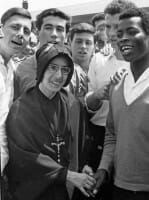
Mar 10, 2015 | Focolare Worldwide
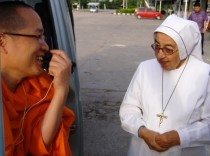 Sister Benedetta, amicably called ‘Sister Bene’ was known to everyone in the Church of Thailand: priests, nuns, bishops and laity from north to south of the country. Several Buddhist monks that visited the focolare regularly also knew her well. Benedetta was a woman who let herself be approached and known, without fear and with gentleness. She knew how to welcome people and you could go to her any time. Any problem, great or small, any need, some good news to share: she wasn’t scandalised by anything, she knew people’s hearts and knew how to love them. One bishop once said of Sister Benedetta that she was “a Sister of silver and gold” because of all the money she was able to find for the poor. When visiting the extreme north of Thailand, you were always obliged to go and ‘have a chat’ with her, as she would say. She enjoyed hearing the news of her ‘great family’ as she loved to call the Movement, and she shared its life with many others. We would often meet people in the Mariapolis to whom she had spoken about the spirituality of unity, or else someone who had passed by the focolare to meet us because they had heard Sister Bene talk about us. In other words, Benedetta was a true spiritual mother who gave much supernatural life to so many people, and many of them attended her funeral along with a large crowd of bishops, priests and laity. The small church of Wien Pa Pao and the adjoining convent where she lived were filled to overflowing.
Sister Benedetta, amicably called ‘Sister Bene’ was known to everyone in the Church of Thailand: priests, nuns, bishops and laity from north to south of the country. Several Buddhist monks that visited the focolare regularly also knew her well. Benedetta was a woman who let herself be approached and known, without fear and with gentleness. She knew how to welcome people and you could go to her any time. Any problem, great or small, any need, some good news to share: she wasn’t scandalised by anything, she knew people’s hearts and knew how to love them. One bishop once said of Sister Benedetta that she was “a Sister of silver and gold” because of all the money she was able to find for the poor. When visiting the extreme north of Thailand, you were always obliged to go and ‘have a chat’ with her, as she would say. She enjoyed hearing the news of her ‘great family’ as she loved to call the Movement, and she shared its life with many others. We would often meet people in the Mariapolis to whom she had spoken about the spirituality of unity, or else someone who had passed by the focolare to meet us because they had heard Sister Bene talk about us. In other words, Benedetta was a true spiritual mother who gave much supernatural life to so many people, and many of them attended her funeral along with a large crowd of bishops, priests and laity. The small church of Wien Pa Pao and the adjoining convent where she lived were filled to overflowing.  Sr Bene, of the Sisters of Charity of the Infant Mary, known to the secular world as Benedetta Carnovali, born in 1925, was a pillar of the Movement and many of the people who belong to the Focolare community of Thailand were personally drawn to the Movement by her (including Buddhists). ‘A real Sister and a true focolarina,’ as she was described by some: an ‘out-of-the-ordinary’ Sister, always on the go and, at the same time, ‘firm’ when personally loving the person next to her. She was a friend who would call you up to wish you a happy birthday, even though her voice became feebler every year, but not her interior strength. Whenever you approached her you were never given the impression that you had disturbed her: it was as if she had been expecting you alone and didn’t have anything else to do but welcome you. But she was quite busy, judging from all the adoptions at a distance which she personally saw to, up until the last days of her life. Sister Bene had met the Focolare’s spirituality of unity from an order priest in 1963, and from that moment spent her life that many in Myanmar – where she was living in that period and then in Thailand when all Religious were expelled by the regime – could know the spirituality and live it. When she was transferred to Thailand, she continued to deepen her friendship with the Focolare. When she went to spend a few days at the focolare, she nourished herself on the words of Chiara Lubich. Like all those who genuinely follow God, Sister Benedetta also encountered her nights, ‘the storm’ as she followed Jesus. She faced them as a true disciple of Jesus, with heroic charity. Deeply united with Vale Ronchetti, one of the first focolarine, she pressed on in the midst of much miscomprehension: ‘How can a nun belong to a movement with so many lay people in it?’ she was often asked; and there were other great and small persecutions that on a human level were completely absurd. Yet, in some mysterious way, God made use of these things to make Sister Benedetta more and more a Sister, more and more a spiritual daughter of Chiara (as Benedetta often said), and an apostle of unity who has no counterpart in the Asian southeast judging from the fruits she bore. She leaves a legacy of love, gentleness, sweetness and strength, loving service to the least: towards the people of the Akha tribe, for example. She leaves us withthat smile so typical of those who have experienced that it is possible to transform suffering in Love and make that Love their reason for living. Sister Benedetta ‘flew” to Heaven at the age of ninety, after listening to the Focolare song that she loved: ‘Solo grazie’. She died consumed but serene, just as she had always lived: in peace because she was certain that the ‘arms’ that had embraced her from her childhood (she was an orphan) and carried her through her life as a Religious, were there waiting for her now on this last stretch of her journey. She was a wonderful woman who shows that it is still possible to become a saint today. Luigi Butori
Sr Bene, of the Sisters of Charity of the Infant Mary, known to the secular world as Benedetta Carnovali, born in 1925, was a pillar of the Movement and many of the people who belong to the Focolare community of Thailand were personally drawn to the Movement by her (including Buddhists). ‘A real Sister and a true focolarina,’ as she was described by some: an ‘out-of-the-ordinary’ Sister, always on the go and, at the same time, ‘firm’ when personally loving the person next to her. She was a friend who would call you up to wish you a happy birthday, even though her voice became feebler every year, but not her interior strength. Whenever you approached her you were never given the impression that you had disturbed her: it was as if she had been expecting you alone and didn’t have anything else to do but welcome you. But she was quite busy, judging from all the adoptions at a distance which she personally saw to, up until the last days of her life. Sister Bene had met the Focolare’s spirituality of unity from an order priest in 1963, and from that moment spent her life that many in Myanmar – where she was living in that period and then in Thailand when all Religious were expelled by the regime – could know the spirituality and live it. When she was transferred to Thailand, she continued to deepen her friendship with the Focolare. When she went to spend a few days at the focolare, she nourished herself on the words of Chiara Lubich. Like all those who genuinely follow God, Sister Benedetta also encountered her nights, ‘the storm’ as she followed Jesus. She faced them as a true disciple of Jesus, with heroic charity. Deeply united with Vale Ronchetti, one of the first focolarine, she pressed on in the midst of much miscomprehension: ‘How can a nun belong to a movement with so many lay people in it?’ she was often asked; and there were other great and small persecutions that on a human level were completely absurd. Yet, in some mysterious way, God made use of these things to make Sister Benedetta more and more a Sister, more and more a spiritual daughter of Chiara (as Benedetta often said), and an apostle of unity who has no counterpart in the Asian southeast judging from the fruits she bore. She leaves a legacy of love, gentleness, sweetness and strength, loving service to the least: towards the people of the Akha tribe, for example. She leaves us withthat smile so typical of those who have experienced that it is possible to transform suffering in Love and make that Love their reason for living. Sister Benedetta ‘flew” to Heaven at the age of ninety, after listening to the Focolare song that she loved: ‘Solo grazie’. She died consumed but serene, just as she had always lived: in peace because she was certain that the ‘arms’ that had embraced her from her childhood (she was an orphan) and carried her through her life as a Religious, were there waiting for her now on this last stretch of her journey. She was a wonderful woman who shows that it is still possible to become a saint today. Luigi Butori
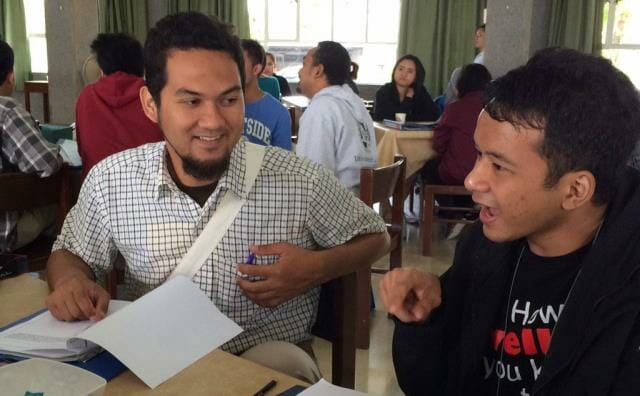
Mar 10, 2015 | Focolare Worldwide
 “The road to a peaceful world is a long one and the choice to take it necessitates the kind of courage that will not falter in the face of suffering, pain and defeat.” This is how Val Fajardo, a young member of the Focolare Movement, expressed her sentiments at the end of the 5-day conference on United for Peace Project 2015 held at Mariapolis Peace, Tagaytay City.
“The road to a peaceful world is a long one and the choice to take it necessitates the kind of courage that will not falter in the face of suffering, pain and defeat.” This is how Val Fajardo, a young member of the Focolare Movement, expressed her sentiments at the end of the 5-day conference on United for Peace Project 2015 held at Mariapolis Peace, Tagaytay City.
The YSEALI (Young Southeast Asian Leaders Initiative)* United for Peace project brought together 30 youth-leader representatives from Thailand, the Philippines and Indonesia to discuss religious and cultural conflicts in Southeast Asia and share best practices in mitigating conflicts in the ASEAN (Association of South East Asian Nations) region. The delegates were varied – fashion bloggers, presidential advisers, teachers, journalists, students, heads of NGOs, and social workers – but all committed to working for peace. During the conference, the group also discussed and explored ways in which intercultural dialogue can serve as a tool to resolve disputes.
“Project for Peace” – The conference covered relevant issues such as Understanding Conflict, The Paradigm of Fraternity, Unity, Reciprocity, The Power of Collective Action, all essential to the peace building effort. The various workshops proved to be effective in bringing to fore the strength, creativity and commitment of each participant. And, compelled with the dire need of peace in the world, the delegates worked intensely on project proposals to address conflict mitigation and resolution that will be implemented simultaneously in their own countries. The peace projects that the three nation delegates have worked on are, “Peace Attack” by Indonesia; “Youth Leaders for Peace Camp” by Thailand; and “Peace for Real” for the Philippine delegations. All the proposed projects are meant to involve countless young people and adults, each as a protagonist for peace!
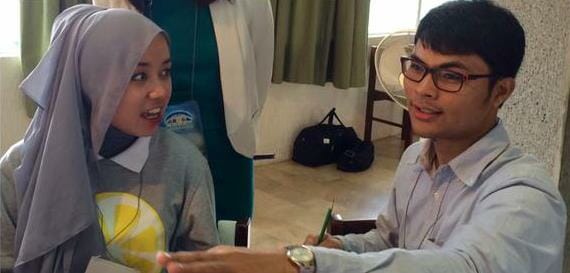 Following the 5-day conference in Tagaytay, three national workshops will take place separately in March in the Philippines, Thailand, and Indonesia involving 150 young leaders.
Following the 5-day conference in Tagaytay, three national workshops will take place separately in March in the Philippines, Thailand, and Indonesia involving 150 young leaders.
At the conclusion of the intense conference, a “Peace Park” was inaugurated and the delegates planted trees in a public school near the Mariapolis Peace. In the middle of the park sits a “Cube of Peace” where various points in building peace are written on each side of the cube, like Treat each person with respect, Share each other’s joys and hurts, Be the first to reach out to the other, Treat others as you want to be treated.
Present during the inauguration were local civil authorities, school heads, educators and students.
The “Peace Park” represented the vision of youth’s United for Peace Project 2015 which is to be united in celebrating differences, building bridges, and bringing about peace, harmony, and unity in the region and in the world. This historical moment bound the hearts and minds of the delegates as they sung together with the youth of the Focolare and all those present the songs Hopes of Peace and Let’s Bridge.
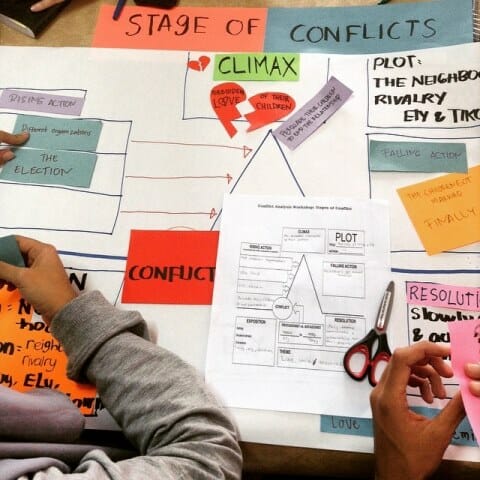 YSEALI gathered young people from different backgrounds, and came out with a solid, efficient and effective project plan to bring peace back to the world. The Focolare Movement has been asked to be a partner in this project until September 2015. A committee – consisting of adult and youth members of the Focolare – was set up in order to design the content of the program and to select suitable resource persons. The Focolare Movement welcomed this opportunity to work with young people and to help them discover that universal brotherhood is the way to resolve conflicts.
YSEALI gathered young people from different backgrounds, and came out with a solid, efficient and effective project plan to bring peace back to the world. The Focolare Movement has been asked to be a partner in this project until September 2015. A committee – consisting of adult and youth members of the Focolare – was set up in order to design the content of the program and to select suitable resource persons. The Focolare Movement welcomed this opportunity to work with young people and to help them discover that universal brotherhood is the way to resolve conflicts.
Nikko Yumul, a member of the Focolare and one the program’s coordinators states: “Young people are at the stage of life where the attraction of working for something much greater than themselves and the will to pursue it are at its height, and where deep, life-long convictions are moulded in their minds and hearts.”
Some impressions shared by the youth: “Building a united world necessarily entails that we go out, as young people, and relate with those who have a vision of the world the same as ours. We are not alone in our efforts. There are others we can share our goals with. Maybe it is about time we involve ourselves with them.”
Source: New City Press Philippines
* Launched in 2013, the Young Southeast Asian Leaders Initiative (YSEALI), which is sponsored by the US Embassy, is a program which aims to strengthen youth leadership development and networking in Southeast Asia. This is done through civic engagement, environment and natural resources management, and entrepreneurship and economic development.
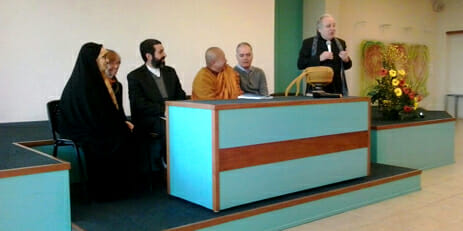
Mar 9, 2015 | Focolare Worldwide
 “In times of hatred and fear I thank God for having chosen us to encounter a spirituality like that of Chiara Lubich, which is able to make humanity experience peace and the real joy of unity. Here in Loppiano, we are experiencing a foretaste of God’s kingdom.” These were the words of one of the six Iranian students who will stay in Loppiano for a month, and take part in the little town’s daily life, 24 hours round the clock. “It is a new experience for all of us,” affirmed Rita Moussallem who with Roberto Catalano is co-director of the Interreligious Centre of the Focolare, “a prophetic sign and promise of hope which tells us that love will overcome all things.” The students come from the women’s seminary, “Jami’at al-Zahra” in the city of Qum (Iran), at about 200 km from Tehran, the capital. This is an academic centre of excellence for Shiite Islam and is the biggest in the world with about 6,000 female students, a thousand of which come from other countries. Qum is a Sciite sacred city due to the presence of important shrines, visited by thousands of pilgrims every year, and seat of numerous universities, with about 100,000 students. This visit is the fruit of the fraternal relationship and dialogue that started a number of years ago between the Centre for Interreligious Dialogue of the Focolare and Dr. Mohammad Ali Shomali, professor at the international section of the women’s seminary of Qum and founder and director of the International Institute of Islamic Studies (in Qum), and also a member of the councils of various academic institutions. He currently resides in London and guides the Islamic Centre of Great Britain. “Last April, upon the invitation of Dr Shomali, we went with some focolarini to Qum,” Roberto Catalano explained, “to visit various university institutes and to get to know each other better. It was because of this that the concrete possibility for a group of students to visit Loppiano came about, to allow them to personally experience the spirituality of unity.” In Loppiano, Dr Shomali with his wife and the students visited the various schools and work sites, and got to meet Loppiano’s inhabitants, listen to their experiences and immerse themselves in the life and activities of the town. An important moment was Dr Shomali’s encounter with the professors and students of the Sophia University Institute. On referring to the name of the Institute he underlined how the concept of wisdom signifies something more than knowledge: “We can listen to the words of knowledge of many people, but the quality of wisdom can only come from God.” The students will now continue to explore the spirituality of unity and its concrete aspects.
“In times of hatred and fear I thank God for having chosen us to encounter a spirituality like that of Chiara Lubich, which is able to make humanity experience peace and the real joy of unity. Here in Loppiano, we are experiencing a foretaste of God’s kingdom.” These were the words of one of the six Iranian students who will stay in Loppiano for a month, and take part in the little town’s daily life, 24 hours round the clock. “It is a new experience for all of us,” affirmed Rita Moussallem who with Roberto Catalano is co-director of the Interreligious Centre of the Focolare, “a prophetic sign and promise of hope which tells us that love will overcome all things.” The students come from the women’s seminary, “Jami’at al-Zahra” in the city of Qum (Iran), at about 200 km from Tehran, the capital. This is an academic centre of excellence for Shiite Islam and is the biggest in the world with about 6,000 female students, a thousand of which come from other countries. Qum is a Sciite sacred city due to the presence of important shrines, visited by thousands of pilgrims every year, and seat of numerous universities, with about 100,000 students. This visit is the fruit of the fraternal relationship and dialogue that started a number of years ago between the Centre for Interreligious Dialogue of the Focolare and Dr. Mohammad Ali Shomali, professor at the international section of the women’s seminary of Qum and founder and director of the International Institute of Islamic Studies (in Qum), and also a member of the councils of various academic institutions. He currently resides in London and guides the Islamic Centre of Great Britain. “Last April, upon the invitation of Dr Shomali, we went with some focolarini to Qum,” Roberto Catalano explained, “to visit various university institutes and to get to know each other better. It was because of this that the concrete possibility for a group of students to visit Loppiano came about, to allow them to personally experience the spirituality of unity.” In Loppiano, Dr Shomali with his wife and the students visited the various schools and work sites, and got to meet Loppiano’s inhabitants, listen to their experiences and immerse themselves in the life and activities of the town. An important moment was Dr Shomali’s encounter with the professors and students of the Sophia University Institute. On referring to the name of the Institute he underlined how the concept of wisdom signifies something more than knowledge: “We can listen to the words of knowledge of many people, but the quality of wisdom can only come from God.” The students will now continue to explore the spirituality of unity and its concrete aspects.

 Is there a “politics that is really worth the trouble” at a time in history moment when politics is totally in crisis, often associated with corruption and special interests? This was discussed during the first of numerous worldwide events marking the 7th anniversary of Chiara Lubich (1920-2008). “Her strong and simple faith,” President of the Italian Republic, Sergio Mattarella, stated: “united to a remarkable ability to read the modern world and accept its challenges, has inspired the life of thousands of people around the world, constantly exhorting national and international institutions to promote values of brotherhood and mutual respect in families, community, and among peoples.”
Is there a “politics that is really worth the trouble” at a time in history moment when politics is totally in crisis, often associated with corruption and special interests? This was discussed during the first of numerous worldwide events marking the 7th anniversary of Chiara Lubich (1920-2008). “Her strong and simple faith,” President of the Italian Republic, Sergio Mattarella, stated: “united to a remarkable ability to read the modern world and accept its challenges, has inspired the life of thousands of people around the world, constantly exhorting national and international institutions to promote values of brotherhood and mutual respect in families, community, and among peoples.” What does it mean to live universal brotherhood in such an environment? Iole Mucciconi, who plays a leadership role at the Presidency of the Council of Ministers, shared his testimony : “It is important to begin each day by committing oneself to do one’s job to the best of one’s ability. I always remember Chiara Lubich’s recommendations for living brotherhood: aim to live an honest life, with moral purity, detachment from money, sharing the joys and sorrows of your sisters and brothers.”
What does it mean to live universal brotherhood in such an environment? Iole Mucciconi, who plays a leadership role at the Presidency of the Council of Ministers, shared his testimony : “It is important to begin each day by committing oneself to do one’s job to the best of one’s ability. I always remember Chiara Lubich’s recommendations for living brotherhood: aim to live an honest life, with moral purity, detachment from money, sharing the joys and sorrows of your sisters and brothers.” The problem of corruption, which unfortunately pervades the Italian State, was also much felt by Raffaele Scamardi, Commissioner of Public Works in the XII District of Rome at a time when magistrates and law enforcement are trying to dismantle a network of brothels that has entangled the Roman capital. “And yet, a politics in favour of others is still possible: repairing roads, listening to citizens and their need for justice, as well as working with the transparency so as to keep corruption at bay.” A similar point was made by Dieudonné Upira Sunguma, one time Civil Service Minister for the Democratic Republic of Congo, who often had to refuse gifts that were meant to corrupt him.
The problem of corruption, which unfortunately pervades the Italian State, was also much felt by Raffaele Scamardi, Commissioner of Public Works in the XII District of Rome at a time when magistrates and law enforcement are trying to dismantle a network of brothels that has entangled the Roman capital. “And yet, a politics in favour of others is still possible: repairing roads, listening to citizens and their need for justice, as well as working with the transparency so as to keep corruption at bay.” A similar point was made by Dieudonné Upira Sunguma, one time Civil Service Minister for the Democratic Republic of Congo, who often had to refuse gifts that were meant to corrupt him.








